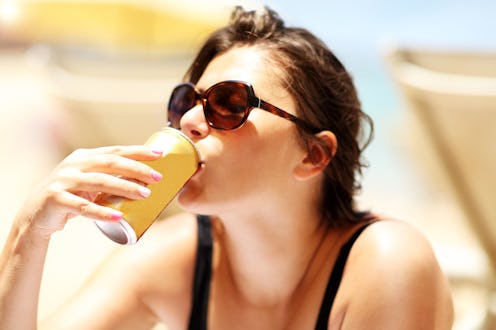Life
If You’re Worried That Your Flavored Seltzer Habit Is Bad For You, Read This

Most of us probably agree that flavored seltzer waters are delicious. Lots of people prefer them to traditional sodas, because you get that fizzy, refreshing, and fruity thing going on without the sugar rush. And, as with all things in life, too much of a good thing can be, well, too much. But is it actually bad for you to drink too much flavored seltzer water?
Myths about seltzer water include concerns about whether or not seltzer can damage your teeth, leech calcium from your bones, or even dehydrate you. But Sara Siskind, a certified nut
ritional health counselor, tells Bustle via email that “Flavored seltzer water can be an excellent alternative to soda and other sugar-loaded drinks."
"Drinking too much flavored seltzer water is certainly not bad for your health, however, I suggest just adding fresh lemon, cucumber, mint, or any other natural fruit to your water to get the flavor you’re looking for,” Siskind says.
According to NBC News, seltzer water is flat water made bubbly by an infusion of a carbon molecule — hence the term, carbonated water. Flavored seltzer waters are simply carbonated water with added flavors, as opposed to club soda which has other added minerals like sodium bicarbonate and sodium citrate. (So, the two are not the same, folks.) Tonic water is also distinct from seltzer water.
According to Healthline, some people claim that carbonation leaches calcium from bones, and causes dental cavities and enamel erosion. However, a 2006 study involving 2,500 participants found that while drinking colas can lower bone density because of their high phosphorus content, other carbonated drinks didn’t seem to have the same effects. And Elite Daily notes that while seltzer waters can cause some wear and tear on your tooth enamel, with regular dental care, you won't see these effects.
Per John Hopkins Medicine, there is a caveat when it comes to drinking flavored seltzer waters: The bubbly drinks are not recommended for anyone dealing with irritable bowel syndrome (IBS), or other digestive problems. Siskind says that the carbonation in seltzers and other bubbly beverages is a gas that can sit in the stomach, causing discomfort for some people. John Hopkins further states that carbonated drinks like seltzers should be avoiding by anyone with IBS or digestive problems, as the fizzy effect from the carbonation can irritate the GI tract.
NBC notes that while seltzer water can be as hydrating as plain old flat water, carbonated drinks can cause stomach cramps for some people during vigorous activity. It’s also good to note that seltzer waters are more filling than regular flat water, so you might be tempted to drink less of them during exercise, NBC further reports. This could be a problem if that feeling of fullness is keeping you from drinking enough water during your workouts.
So, while flavored seltzer waters are probably not that bad for you, your best bet is to avoid them if you manage IBS or other digestive conditions. And make sure to pay attention to how your body feels if you do drink them during exercise; if you experience any discomfort or cramping, then save the LaCroix for later.